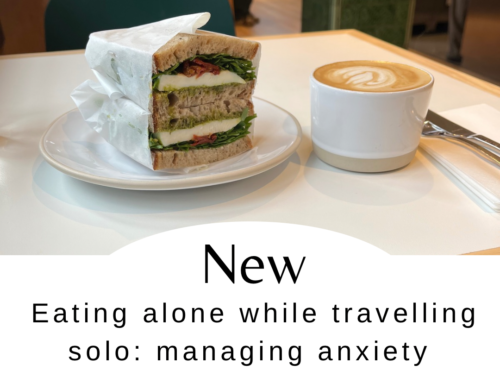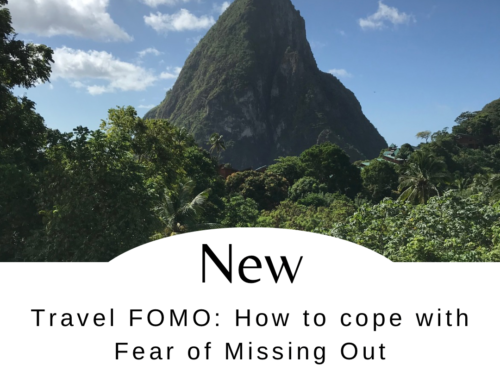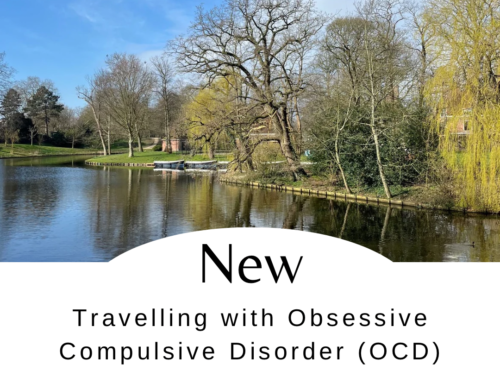Dr Charlotte Russell, Clinical Psychologist & Founder
Here at the Travel Psychologist we often write about how beneficial travel can be for our well-being and mental health. But the truth is, not every trip is enjoyable. Sometimes we just don’t gel with the destination or it doesn’t live up to our expectations. I wrote more about this in How can I make the most of a disappointing trip?
Another possible reason for not enjoying a trip is low mood or depression. It is possible for travel to trigger existing difficulties with mental health and this can be very difficult when it happens. In this article I’m going to talk you through ways of recognising and understanding depression while travelling. I’m also going to be offering advice on coping strategies that might be helpful in this situation.
Depression on vacation
Not enjoying something that you would usually enjoy can be an indicator of low mood. If this is the case and you would usually enjoy travelling and have done in the past, it is possible that your mood is low or that you are depressed. Other indicators that this is the case would be:
- Lack of motivation
- Lack of interest
- Lack of energy
- Feeling disconnected
- Withdrawing from other people
- Feelings of shame and/or guilt
- Feeling hopeless about the future
- Trouble concentrating
It is important to note that these symptoms have to be persistent to be considered depression. This means that they have to be present most of the time for at least two weeks. A widely used questionnaire measuring depressive symptoms can be found here. This can give you an indication of whether you might be depressed and the severity of your symptoms.
Why might I be experiencing depression while travelling?
If you are experiencing depressive symptoms whilst on vacation, these may have been triggered by challenges related to your trip. In most cases however, it is more likely that you were depressed before travelling. For some people, their mood will improve on the lead up to their trip because of the hope and excitement of travelling. This is understandable but it can mask your symptoms rather than address your difficulties. This is particularly likely if you don’t have coping strategies in place. This can mean that you will be left feeling disappointed when difficult feelings and symptoms start to show up on your trip.
What should I do if I am depressed while travelling?
Depression is often a complex condition and so it can be hard to provide general advice that is right for everyone. However it can certainly be treated. Effective talking therapies enable you to develop a range of tools to cope. For many people anti-depressant medication can also be helpful.
It is important to say that for most people who experience persistent depression through their lives, early experiences are a factor. You might have grown up in an environment that didn’t feel safe or you may have had your feelings invalidated on a regular basis. You might have experienced trauma. The message here is that it is important to be understanding to yourself and your situation. No one chooses to feel this way and you are doing your best.
Managing depression while travelling
Below I’ve provided some advice on what may help with your mood when travelling.
Coping strategies
It is easy to underestimate how effective basic coping strategies can be, but they are really important. In depression often people will stop doing the things that help because they think “what’s the point?”. This kind of thinking is characteristic of depression but is not helpful. Putting basic strategies in place will help you to feel better.
Basic coping strategies for managing your mood include:
- Keeping a regular sleep routine
- Eating three healthy meals a day
- Exercising several times a week
- Putting effort into maintaining relationships with friends and/or family members, which can include calling and texting them
- Putting effort into structuring your day and week by arranging activities that provide you with a sense of purpose and/or make you feel better
Noticing unhelpful thinking
Negative thinking is characteristic of depression and it is important to notice when you are thinking in a way that is not helpful. Examples might include
- The trip is ruined
- I’m never going to feel better
- My travel companions are sick of me
- I’ve wasted the trip / so much time / money
- I’m never going to feel better
These thoughts are very unhelpful as they make you feel worse. They are also likely to get in the way of doing things that will actually help.
Goal setting
Setting yourself realistic and meaningful goals is one of the best things you can do to help with your mood. Think about what is meaningful and realistic to you in your specific situation.
An example might be to go out and see one sight or do one activity each day.
It does not matter if the goal is not what you originally intended to do or is different to what other people are doing. It is important that the goal is right for you and how you are feeling at the moment.
If one activity/sight/conversation is what is meaningful and realistic for you, stick with that.
Making decisions about your trip or itinerary
If there are things about the trip that are not working for you or are triggering your symptoms, it is important to do your best to address these.
Accommodation choices
Perhaps you are realising that you are introverted and need time on your own to recharge. If this is the case and you are sharing dorms each night, it is possible that this is becoming too much for you. Think about whether it is possible to upgrade to a private room once a week or week or fortnight. Many people in this situation will feel much more like themselves after even a short amount of alone time. Think of these as ‘pit stops’ to recharge your energy.
On the other end of the spectrum you might be more extroverted and may be craving connection with others. Think about how you might achieve this. If you are struggling to make connections in your destination, maybe a long phone call with a family member or an old friend back home is just what you need.
Destination choices
Maybe the destination you have visited isn’t what you hoped it would be. If this is the case think about what would help you to make the most of your time there. I wrote more about this in How can I make the most of a disappointing trip?
Consider accessing therapy
Many therapists work online these days and it is possible to access a therapist even when you are travelling. Finding a therapist online can help you to manage your mood and to make the most of your time away.
Therapy will help you to understand your own difficulties and to develop a range of coping strategies that are right for you. As I mentioned earlier, depression can be a complex condition. Therapy often involves looking at your unique history and circumstances and working with you to find solutions.
If you have had therapy before and haven’t found it effective, please don’t let this put you off. Maybe you didn’t gel with the therapist, maybe the approach did not suit you or perhaps it was not the right time. It can sometimes take some time to find the right therapist and the right approach.
Psychology today is a good place to start and lists registered therapists in many countries. The term ‘registered therapist or psychologist’ is important because it means having professional standards and codes of practice. This ensures that the therapy you are offered is safe and effective.
Avoid looking for therapists or coaches on social media without checking their qualifications or registration. Any genuine therapist will be happy to provide this information.
Should I come home from travelling?
This is a personal decision that only you can make in your circumstances. It is important to remember that there is no right or wrong. You have to make the decision that is right for you.
If feelings of not coping seem to pass and the above strategies seem to help, continue with those.
On the other hand, indicators that you should consider ending your trip would be:
- Trying the above strategies and not seeing any improvement
- Not enjoying any aspect of your trip
- Feeling like you are not coping often or most of the time
- Thoughts about harming yourself
If you are experiencing any of the above, consider returning home. This will allow you to focus on getting your mental health back to a stable place. Remember that travel will always be waiting for you when you are feeling better. In the future you will have learned from your current trip even if you don’t see it right now. These experiences will help you to enjoy and appreciate all those other trips you will take in the future.
If you found this helpful, please see our previous article Managing your mental health while travelling – The Travel Psychologist





